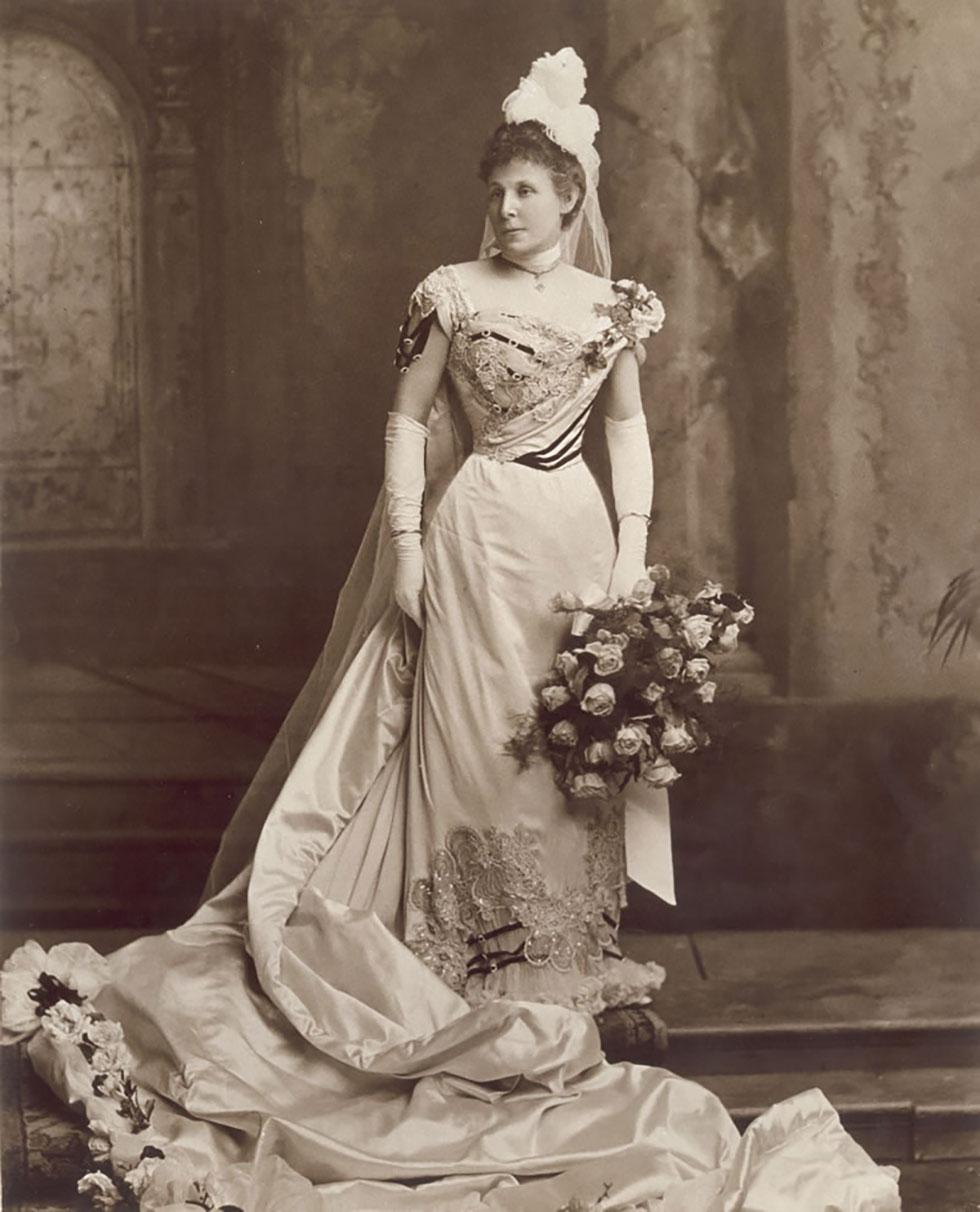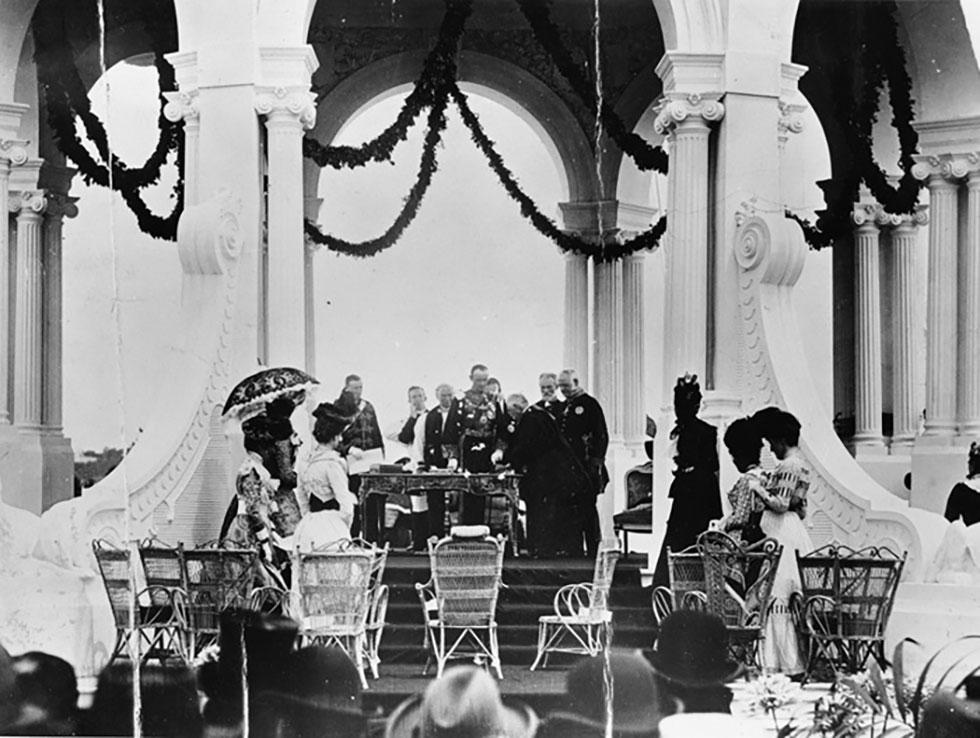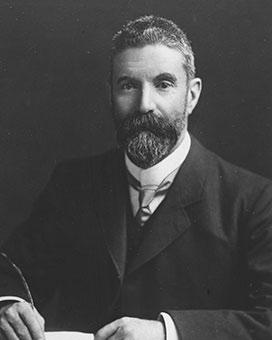
Jane Barton in June 1902, when she attended the coronation of King Edward VII and Queen Alexandra. By permission National Library of Australia. Barton Papers MS51, PIC/6055/2.
Jane (Jeanie) Mason Ross was born on 11 June 1851, and married Edmund Barton in 1877, when she was 26 years old. He was then a barrister, and 2 years later won a seat in the New South Wales parliament.
From 1896, the Bartons’ new house ‘Miandetta’ in Carabella Street, North Sydney, was the home of the Federation movement. Jane and Edmund Barton held ‘open house’ on Sunday evenings. Among the most frequent attendees were young men who later took prominent places in building the nation, such as Robert Garran, Arthur Hunt and Thomas Bavin. This was also the house where the Barton’s 6 children, the youngest born in 1892, grew up, and where Mrs Barton, a charming and well-educated woman, furthered the work of Federation through the social networks developed in private and public occasions.
After the ‘Yes’ vote at the New South Wales Federation referendum held on 20 June 1899, the Bartons travelled to Hay at the invitation of the men’s and women’s federal leagues in the district. At the celebratory dinner held at Tattersalls Hotel, Barton toasted the work of the Women’s Federal Leagues, acknowledging Mrs Barton’s work. Her position as a vice-president of the second Sydney women’s federal league was only one of the ways Mrs Barton and her associates fuelled Federation.
During the visit of the Australian delegation to London in 1900, Mrs Barton was part of proceedings from the moment of departure on 15 March to their return on 6 July. The estimated 3000 influential people lobbied by the delegation included those at the banquets, luncheons and weekend house parties where Mrs Barton – proud to have lost all trace of her Scots accent – played her part among the Empire’s most powerful elites. At the grand federal banquet for 600 guests on 1 May 1900, Mrs Barton met and conversed with numerous dignitaries, including Edward, Prince of Wales.

Inauguration of the Commonwealth at Centennial Park, Sydney on 1 January 1901. NAA: A1200, L83907
On the eve of the birth of the new nation, with Alfred Deakin their house guest, the Bartons were awakened at midnight by the clamour of harbourside celebrations for the new year and the inauguration of the Commonwealth. Later that day, Lady Hopetoun and Mrs Barton took their places at the inauguration ceremony. The women were allocated the same order of precedence as the Governor-General and the Prime Minister, signifying the official status of each woman in the new nation.
In May 1901, Mrs Barton also took her place of precedence at the opening ceremony of the first parliament in Melbourne; but for most of the next 12 months, the Bartons were separated during sitting weeks, unable to afford the expense of establishing a second family home in Melbourne. In May 1902, the prime ministerial pair again left for London, this time for the coronation of King Edward VII and Queen Alexandra. Mrs Barton participated in the many ceremonies attended by the Prime Minister, including the presentation of the Freedom of the City of Edinburgh, the award of an honorary degree at the University of Oxford, and the conferring of the knighthood, by which she became Lady Barton. That summer her skills were honed at other events, such as the weekend house party at Warwick Castle, where Lady Warwick ensured the Bartons met luminaries such as the young Winston Churchill. She was also charged with the responsibility of presenting Queen Alexandra with a large possum fur carriage rug, a gift from New South Wales arranged by Alexander Oliver, to ‘remind the Royalties of the State of the new Union’.
After passing on her role to Pattie Deakin in September 1903, Lady Jane Barton was prominent in Sydney organisations such as the Queen’s Club, of which she was founding president. Her capacity for articulate and reasoned views is evident in the Bartons’ surviving correspondence, in those instances where Barton sought her comments on both political issues and his work at the High Court.
Lady Barton died in 1938 at ‘Avenel’, the Darling Point, Sydney, house the Barton’s had moved into in 1909.
Sources
- Bolton, Geoffrey, Edmund Barton, Allen & Unwin, Sydney, 2000.
- Irving, Helen, ‘Fair federalists and founding mothers’ in Helen Irving (ed.), A Woman's Constitution? Gender and History in the Australian Commonwealth, Hale & Iremonger, Sydney, 1996.
- Alexander Oliver to Edmund Barton 4 May 1902, Barton Papers, MLM SS 249/4, Mitchell Library, State Library of New South Wales.





